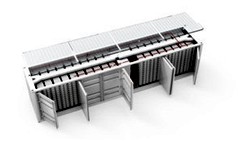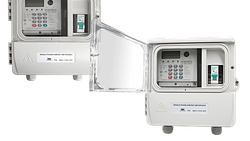Smart metering infrastructure has revolutionized the utility industry by enabling more efficient and accurate monitoring of energy consumption. With the increasing adoption of smart meters, it is essential to deploy and scale the infrastructure effectively. In this article, we will explore the best practices for deploying and scaling smart metering infrastructure, ensuring seamless operations and optimal performance.
Planning and Design
Conduct a thorough feasibility study
Before deploying a smart metering infrastructure, it is crucial to conduct a feasibility study to assess the technical, financial, and operational aspects. This study should include evaluating the existing infrastructure, identifying potential challenges, estimating costs, and assessing the benefits of deploying smart meters.
Develop a comprehensive deployment plan
A well-defined deployment plan is critical for the successful implementation of a smart metering infrastructure. The plan should include a timeline, resource allocation, stakeholder engagement, and communication strategies. It should also consider factors such as meter installation logistics, data management, and integration with existing systems.
Design a scalable and future-proof infrastructure
While designing the smart metering infrastructure, it is essential to consider scalability and future needs. It should be capable of accommodating additional meters and evolving technologies without significant disruptions. This involves selecting robust communication protocols, data management systems, and hardware that can handle increased data volumes and support future innovations.
Communication Technologies
Evaluate communication technology options
A robust and scalable network architecture is essential for smart metering deployment. Both wired and wireless technologies, such as power-line communication (PLC), radio frequency (RF), or cellular networks, offer distinct advantages and challenges. Assessing factors like coverage, reliability, scalability, and data security is vital to determine the most suitable network architecture for the specific deployment environment.
Implement a secure communication network
Security is paramount in a smart metering infrastructure to protect customer data and ensure the integrity of the system. Use encryption and authentication protocols to secure data transmission and implement robust access controls. Regularly update and patch communication devices to address any vulnerabilities.
Consider a hybrid communication approach
In some cases, a hybrid communication approach combining multiple technologies may be the most effective solution. For example, using a combination of power line communication and cellular networks can provide reliable and cost-effective connectivity. This approach allows for redundancy and ensures uninterrupted communication in case of network disruptions.

(credit CLOU/Clipdrop)
Data Management and Analytics
Establish a centralized data management system
A centralized data management system is crucial for collecting, storing, and processing the massive amount of data generated by smart meters. This system should be scalable, secure, and capable of handling real-time data streams. It should also support data validation, cleansing, and integration with other utility systems.
Implement advanced analytics and visualization tools
To derive actionable insights from smart meter data, implement advanced analytics and visualization tools. These tools allow for real-time monitoring, anomaly detection, demand forecasting, and customer segmentation. They enable utilities to optimize energy distribution, identify energy-saving opportunities, and improve overall operational efficiency.
Ensure data privacy and compliance
Data privacy is of utmost importance in a smart metering infrastructure. Comply with relevant data protection regulations and implement measures to safeguard customer data. Provide customers with clear information on data collection, usage, and their rights. Establish robust data governance practices to ensure compliance and build customer trust.
Vendor Selection and Partnerships
Assess vendor capabilities and experience
When selecting vendors for smart meter deployment, assess their capabilities, experience, and track record. Evaluate their expertise in smart metering technologies, integration capabilities, and their ability to provide ongoing support and maintenance. Consider their financial stability and long-term commitment to the industry.
Foster partnerships and collaborations
Collaboration with industry stakeholders, such as utility companies, technology providers, and regulatory bodies, is crucial for successful smart metering deployments. Engage in partnerships to share knowledge, exchange best practices, and address common challenges. Participate in industry forums and conferences to stay updated on the latest trends and developments.
Consider interoperability and standards
Interoperability and standardization play a pivotal role in the scalability and long-term success of smart metering infrastructure. Adhering to open standards and industry protocols enables seamless integration with other smart grid components and applications. Collaboration among stakeholders, including utilities, vendors, and regulatory bodies, is vital to establish common standards and promote interoperability.
Training and Change Management
Train staff and stakeholders
Proper training is essential for the successful adoption of a smart metering infrastructure. Train utility staff, meter installers, and customer service representatives on the new technologies, processes, and data management practices. Educate customers on the benefits of smart meters and how to interpret their energy consumption data.
Implement change management strategies
Implement change management strategies to address potential resistance to the deployment of smart meters. Communicate the benefits of smart metering to customers, address privacy concerns, and provide ongoing support. Involve stakeholders, such as customer advocacy groups, in the planning and decision-making process to ensure their buy-in and support.
Continuously monitor and evaluate
Monitor the performance of the smart metering infrastructure regularly and evaluate its effectiveness. Collect feedback from customers, utility staff, and other stakeholders to identify areas for improvement. Keep up to date with advancements in technology and industry best practices to ensure the infrastructure remains efficient and future-proof.
Takeaway
Deploying and scaling smart metering infrastructure requires careful consideration of various factors, including technology selection, network architecture, data management, regulatory frameworks, interoperability, and cybersecurity. By following best practices and incorporating lessons learned from successful deployments, stakeholders can harness the benefits of smart metering, such as improved energy management, enhanced grid performance, and empowered consumers.
At CLOU Global, we are specialized in smart meters, deployment, and system solutions. Our experienced team of experts is ready to assist you with any questions or concerns you may have regarding smart metering. With our expertise and dedication to delivering reliable and innovative solutions, we are committed to supporting the successful implementation of smart metering infrastructure and helping you achieve your energy management goals.
Editor's note: This article was originally published in September 2023 and has been updated for comprehensiveness.





All comments are moderated before being published. Inappropriate or off-topic comments may not be approved.